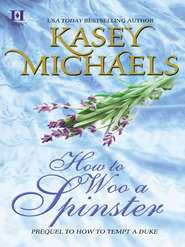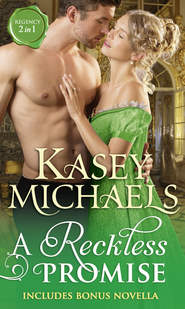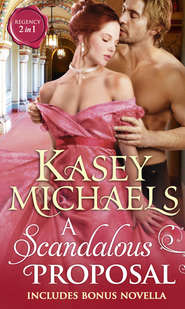По всем вопросам обращайтесь на: info@litportal.ru
(©) 2003-2025.
✖
A Gentleman By Any Other Name
Автор
Год написания книги
2018
Настройки чтения
Размер шрифта
Высота строк
Поля
Which brought Chance back to the most recent addition to his small traveling company, the amazingly forceful Miss Julia Carruthers. Would she be ready to travel?
Chance smiled wryly. The woman would probably be ready to travel in an instant. All she’d have to do is slide a leg over her broomstick.
Still, anyone was better than Mrs. Jenkins. How could Beatrice have countenanced such an unsuitable woman? Worse, how had he not noticed that the woman was totally unacceptable?
The answer to both questions, of course, was that neither he nor Beatrice had paid all that much attention to Alice. Children were kept in the nursery, out of sight, often out of mind. Indeed, Alice had been rarely in London with them, and they had been even more rarely in the country with her. In the circle of society in which he and Beatrice moved, that was natural, that was accepted.
And wrong. So very wrong.
The months after Beatrice’s short illness and death, even though he’d sent for Alice, Chance had been too busy at the War Office to spend any real time with the child.
No, that was a lie. He could have found time for his daughter; he simply hadn’t.
And yet, Alice seemed to worship him, which was more than embarrassing. He’d almost rather she hated him or was indifferent to him.
Alice needed stability. She needed a good home and people who loved her. Besides, in that gaggle at Becket Hall, one small child could hardly make much of a difference. She’d simply be absorbed, taken up the way Ainsley Becket had taken up Chance, had taken up all of them.
And then he, Chance Becket, would be free to return to London and get on with this dreary business that was supposedly the ordinary, civilized life he had always wanted.
The coach drew to a halt, and Chance opened the door before jumping down lightly to the flagway without waiting for the groom to let down the stairs. “Be prepared to travel to Becket Hall at six tomorrow morning, Billy,” he called up to the coachman. “Both coaches. And Jacmel, as well.”
Ignoring Billy’s heartfelt “Huzzah!”, Chance climbed the few steps to his front door two at a time and entered without waiting for the footman, who should have already been there opening the door for him.
The entire ground-floor foyer, in fact, was empty; nobody there to meet him, greet his guests or even protect his home. These things had always taken care of themselves, his life moving along without a ripple. How was he to know that it was the ailing Mrs. Gibbons who held the ship steady and not his butler?
He stripped off his hat, gloves and the greatcoat he’d worn to protect him from the damp mist of a London evening and headed up the stairs. Toward the noise he could hear. Voices, raised.
“Here, here,” he reprimanded when he saw half his staff—what had to be half his staff—gathered around the closed doors to the drawing room. “What’s all this about?”
“Oh, Mr. Becket, sir,” Gibbons said, pushing his way through the small crowd of maids and footmen—and one young girl wearing an overly large white apron and holding what looked to be a half-plucked pigeon. “It’s Mrs. Jenkins, sir, and Miss Carruthers with her, poor thing. She’s not going quietly.”
“Not going where?” Chance asked, then stopped, flabbergasted at his own stupidity. He’d hired Julia Carruthers. Obviously, as Mrs. Jenkins had refused to relocate herself to Becket Hall. It was all perfectly logical, to a point, with only one minor yet rather important detail overlooked. He hadn’t told Mrs. Jenkins to take herself off, had he?
But these had been his decisions, damn it all to hell, even if he hadn’t as yet quite gotten around to explaining them to Mrs. Jenkins before leaving for the War Office. Now there were two nannies in the household, and one of them had become instantly superfluous. Gibbons had referred to Miss Carruthers as the “poor thing.” God. Had the older woman attacked her unwary replacement?
“Where is Alice?” he asked Gibbons. “And unless you want your head on a pike and your carcass pickled, tell me my daughter isn’t in there.”
Gibbons flinched. “Oh, no, sir. Bettyann’s got her all right and tight up in the nursery. It’d been the other way round, with Bettyann and MissAlice down here, but then Mrs. Jenkins comes running down the stairs—the front stairs, sir!—screeching for you at the top of her lungs, and Miss Carruthers right behind her. So Bettyann—she’s a good one, sir—she snatches up Miss Alice and takes her off, and…Oh, sir, you really shouldn’t have left things up in the air, sir, begging your pardon.”
“How can a man believe himself competent to help manage the war effort when he cannot so much as maneuver his way in his own household? No, Gibbons, don’t answer, it isn’t necessary. Everyone, take yourselves back to wherever you belong. Not you, Gibbons. You have someone pack up Mrs. Jenkins’s things and have them at the servants’ entrance in ten minutes.”
“Yes, sir,” Gibbons said, bowing. “And Miss Carruthers’s cases are already sitting in the kitchens ever since Richards fetched them from the White Horse. Shall I have them taken up to the nursery?”
“Whatever you think is right, Gibbons. I believe I’m quite done with managing domestic matters,” Chance said, then squared his shoulders and headed for the double doors…and the commotion going on behind them.
He spied Mrs. Jenkins the moment he pushed open the doors, the rather large woman standing in the middle of his drawing room, her fists jammed onto her hips as she stared across the room.
“And I say I stay right here until the bugger brings himself home! Then we’ll see, missy.”
Chance took three steps into the room, at last seeing Julia Carruthers as she sat, with her exceptional posture, in a chair near the front windows, looking as calm and placid and as regal as the queen on her throne. Vicars’ daughters obviously must be made of stern stuff!
“Shall we be forced to go through this again? I smelled the gin, Mrs. Jenkins,” Julia said, not noticing Chance’s presence, as she was wisely keeping her gaze solidly on Mrs. Jenkins, who looked more than ready—and able—to launch herself toward her. “You are, madam, a disgrace and an abomination, and so Mr. Becket will be told when he at last deigns to bring himself home and take care and command of his own household.”
Insults from both women, Chance realized. First a bugger, and then, clearly, a total failure at managing his household. Standing still and waiting for more damning revelations really didn’t appeal, so he said, “Ladies? At long last, the bugger’s home. May I ask what’s going on here?”
Julia Carruthers, he noticed, was intelligent enough to keep her mouth firmly shut, but he wasn’t quite so fortunate with Mrs. Jenkins.
“There you are!” she said, turning on him. “This…this girl dared to turn me off, tell me to leave. I’ll not be listening to the likes of her, let me tell you! Your lady wife took me on just afore she died, Lord rest her, and I’ve been doing my job just as I aught and I won’t be—”
“Your belongings and a five-pound note will be outside the servants’ entrance in ten minutes, Mrs. Jenkins. I would suggest that you be there to gather them up or else remain here and explain to me why I shouldn’t personally toss your gin-soaked self onto the flagway. An action, by the way, from which I would derive great pleasure and satisfaction.”
He couldn’t quite suppress a smile as the shocked woman opened and closed her mouth several times before picking up her skirts and running from the room.
Julia could no longer contain herself. “You’re going to give that terrible woman five pounds? She doesn’t deserve a bent penny. In any event, I was handling the matter.”
“I beg your pardon?” Chance slowly turned to look at Miss Carruthers, who had risen from her chair and was now walking across the room toward him with some determination, her arms folded beneath her bosom. Lord, but the girl was in a fury.
Julia knew the words I beg your pardon had sounded, in tone, much more like This is none of your business, you cheeky twit. But she’d just spent nearly an hour with Mrs. Jenkins, a woman with absolutely no redeeming qualities. She was, quite simply, too tired, too hungry and much too angry to stop herself.
“We’ll dispense with the small fortune you plan to gift the creature with, Mr. Becket, and concentrate on the woman. You knew that dreadful person was all but a sot and yet you kept her on?” She pushed one arm up straight and pointed toward the ceiling. “May I remind you in case the fact has slipped your mind—that’s your child up there, Mr. Becket.”
Chance was stung into explaining himself. “I would have one of the maids bring Alice to me when I wished to see her. I didn’t really know much about Mrs. Jenkins. Not until last week, when I informed the woman we’d be leaving for Becket Hall and she would remain there with Alice and I realized that she was totally—oh, the devil with it! Who are you to question me?”
Julia’s anger left her as self-preservation raised its not very noble but definitely necessary head. “I’m sorry, sir. I shouldn’t have taken it upon myself to dismiss Mrs. Jenkins. And I have no right to badger you about your…your arrangements concerning Alice. In my defense, I can only say that it has been a long day. A very long day.”
As it had been for him. “And about to become longer, Miss Carruthers,” Chance said wearily, “for we leave for Becket Hall at six tomorrow morning, a very convenient leave-taking or else I would replace you. However, you, madam, having routed Mrs. Jenkins, are now in charge of preparing my daughter for the journey. Oh, one thing more. May I say how gratified I am to see that Alice now has a tiger to defend her, although I would remind you that she needs no defense from me. And now, if you don’t mind, I believe your place is in the nursery, while mine is here, getting myself dedicatedly drunk.”
“Yes, sir. Forgive me, sir. Good evening to you, sir,” Julia said, curtsying to the man when she’d really much rather be boxing his ears. She then quickly swept past him and into the hallway, where Gibbons, with a slight nod of his head and shifting of his eyes, directed her toward the back of the house and the servant stairs.
CHAPTER THREE
THE JOURNEY BEGAN AS did many journeys in England—amid a damp drizzle and accompanied by considerable fog.
Julia had roused Alice at five, only long enough to direct the child to the water closet and then wash her face and hands before pushing her reluctant limbs into a short blue gown Julia considered suitable for travel and a fur-trimmed blue coat with matching bonnet. She then carried the child down three flights of stairs and hoisted the once-again-sleeping princess into the traveling coach and wrapped her in a coach blanket.
Six o’clock of the morning, indeed! Did the man possess no sense at all?
“Watch her, please, Bettyann,” Julia asked of the housemaid who had followed behind Julia carrying Buttercup and a small portmanteau Julia had filled with items she considered necessary for a child’s comfort inside the coach. “I’ll only be a minute.”
Julia paused a moment to look at the fog that all but obscured the street. At home there was nearly always a morning mist, but it was white and smelled like fresh grass and the sea. Here the fog was yellow, dirty. She believed she could actually taste it. “Why did I ever think I would care for London?” she asked herself, then hiked up her skirts with more of an eye toward speed than decorum and headed up the steps once more, for she’d left her bonnet, gloves and pelisse in the nursery.
“Here now,” Chance Becket said warningly, grabbing at her shoulders as she all but cannoned into him, her gaze directed on the steps. “There’s no need for such a rush, is there?”
Julia looked up at the man, struck yet again by his fine good looks and, this morning, the hint of real humor in his eyes. He was dressed for travel, a gray many-caped greatcoat hanging from his broad shoulders, the snow-white foam of his neck cloth visible at his throat, and he wore a matching gray curly-brimmed beaver hat.
Tall, handsome, his smile almost boyish even while the sparkle in his eyes told her he was far from a boy. Julia sent up a short prayer that she wouldn’t disgrace herself by swallowing her own tongue, drat the man.
“You said six o’clock, sir,” she reminded him, doing her best to ignore the heat of his hands that could be felt through the thin stuff of her gown.











